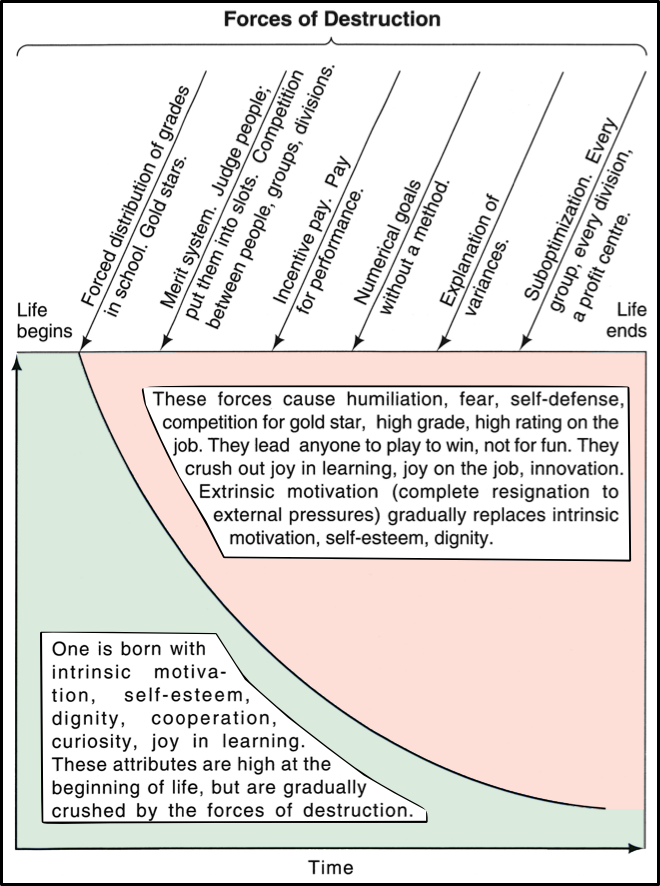The Forces of Destruction
Robbing the Individual of their Self-Worth
We are living in a prison, under tyranny of the prevailing style of interaction between people, between teams, between divisions. We need to throw overboard our theories and practices of the present, and build afresh. We must throw overboard the idea that competition is a necessary way of life.
Deming, Dr. W.E., The New Economics, 3rd ed. (p. 83)
The prevailing forces of destruction start early in life— grades in school from toddler on up through the university, gold stars for school athletics, merit system or annual appraisal on the job, incentive pay, work standards, MBO (rather, MBIR: Management by Imposition of Results), MBR (Management by Results). These forces of destruction must be replaced by leadership.
Deming, Dr. W.E., from the Foreword to The Deming Dimension, by Neave, Dr. Henry. (p. vii)
What [the forces of destruction] do is to squeeze out from an individual, over his lifetime, his innate intrinsic motivation, self-esteem, dignity. They build into him fear, self-defense, extrinsic motivation. We have been destroying our people, from toddlers on through university, and on the job. We must preserve the power of intrinsic motivation, dignity, cooperation, curiosity, joy in learning, that people are born with.
Deming, Dr. W.E., The New Economics, 3rd. ed. (p. 83)
“You came here to learn how to change, not just patch up. Not just to work downstream. It is so easy to do that, with very little help. Don’t laugh it off…
My job is to find out the sources of improvement, sources of trouble. I said source, not downstream. That is what I have been doing. And as you go to the sources, you see that change is absolutely necessary.”
Walton, Mary. The Deming Management Method. (p. 24)
THE AIM of this post is to provide a synopsis of the motivations behind Dr. Deming’s view of transformation which he describes in the sixth chapter of The New Economics as the Forces of Destruction (of the Individual), along with its cure, the Restoration of the Individual.
What Are the Forces of Destruction?
Put simply, they are the accrued effects of a life sentence spent in pursuit of rewards, from grades and gold stars when we’re young, to winner-take-all competitive contests, incentives, and merit appraisals when we’re adults. They are the unique creation of what Dr. Deming called the “tyranny of the prevailing style of interaction between people, between teams, between divisions” - a feature of modern management theory and thinking on how people are best organized and led that inculcates all of our institutions and organizations, public and private:
Dr. Deming diagnosed these forces as the prevailing system of management working as designed to gradually rob people of their positive traits like curiosity, enthusiasm for learning, and cooperation and replacing them with defensiveness, fear, humiliation, and adversarial “I win, you lose” competition as a universal solvent. Arbitrary targets are assigned without any means or explanation of how to achieve them. Pride and joy in work becomes diminished and compensated with cheap gestures and inducements to overlook deficiencies in leadership’s understanding of their obligations to improve.
Once you understand these forces, you can see them at play almost everywhere…








Rx? Transformation, NOT Reformation
For Dr. Deming, the prevailing system of management in all its various guises was beyond repair: It was the upstream cause of all downstream problems that were leading North American businesses and institutions into decline, predicated first and foremost on the destruction of the principal component of all attendant systems: The individual.
In his view the only way to reverse the decline the Forces of Destruction set in motion was through transformation of the whole system of management rather than reformation of its parts which would leave the root causes untouched. NB: the latter describes much of what passes for “transformations” today, eg. “agile”, “lean”, “digital”, etc. which only address changing what people do rather than the systems that direct them.
This, therefore, is the basis for Deming’s view of transformation: To restore the power of the individual by eliminating, one by one, the forces set against them through study and application of what he called profound knowledge, ie. the four domains of Appreciation of a System, Theory of Variation, Theory of Knowledge, and in a clever meta-application of his brief lesson, Psychology.

Limitless Benefits
Once unburdened of the Forces of Destruction, Deming foresaw limitless potential through the restoration of the innate qualities and characteristics we’re all granted at birth:
The transformation will take us to a new method of reward. We must restore the individual, and do so in the complexities of interaction with the rest of the world. Transformation will release the power of human resource contained in intrinsic motivation. In place of competition for high rating, high grades, to be Number One, there will be cooperation on problems of common interest between people, divisions, companies, competitors, governments, countries. The result will in time be greater innovation, applied science, technology, expansion of market, greater service, greater material reward for everyone. There will be joy in work, joy in learning. Anyone who enjoys his work is a pleasure to work with. Everyone will win; no losers.
The New Economics, 3rd ed. (p. 85)
A Word on Why Transformations Fail
Dr. Deming was fond of using a phrase he learned from colleague Dr. Edward M. Baker to get across his reasons for abandoning rather than fixing or patching the prevailing system of management: “One can learn all there is to know about ice, yet know very little about water.” His point? That we cannot get to a new state by doubling-down on refining the old. It takes courage and clarity of vision to understand why you are undertaking the transformation.
I leave here a message I came across last week by professor Gary Hamel that I think apropos to consider on why the transformations we see around us today don’t take hold, and it can certainly apply to Deming-inspired variations:


Reflection Questions
Consider Dr. Deming’s theory of transformation and the Forces of Destruction set against people: How many are you contending with in your organization right now? How many are your friends and family beset by? What do you observe in your community, province or state? Country? What have been the effects? What effects does the prevailing style of interactions precipitate in our economy? How does it characterize what capitalism is versus what it could, or should be?
How many times have you found yourself inadvertently participating in contests for prizes or awards at school or work, or encouraging others to do so, even though you know it comes at a price? How many goals without methods are you pursuing? How did you feel after your last performance appraisal? How do you feel about the next one? What could you do, instead?
Consider Prof. Hamel’s observation on why transformations fail: Does this align with what you have observed in your experience? Are the transformations you have participated in been deep or shallow? Why? How were people engaged and treated? What was the effect: Abandonment? Adaptation? Blind sustainment?






Here's an idea you should pursue:
https://substack.com/@bobrutherford204406/note/p-175291855?r=bvjvd